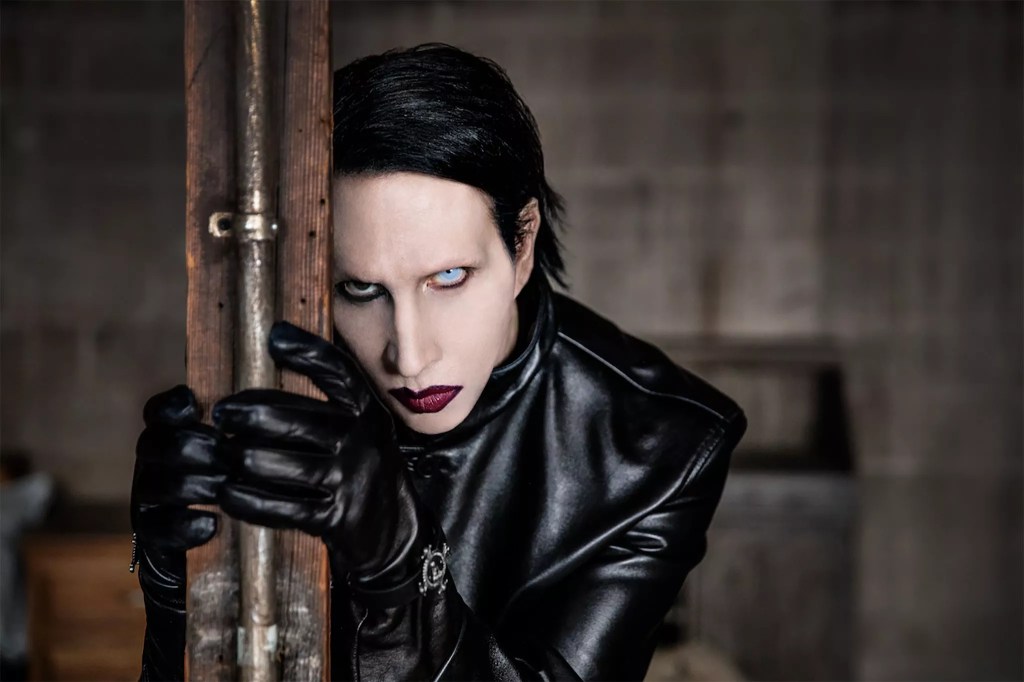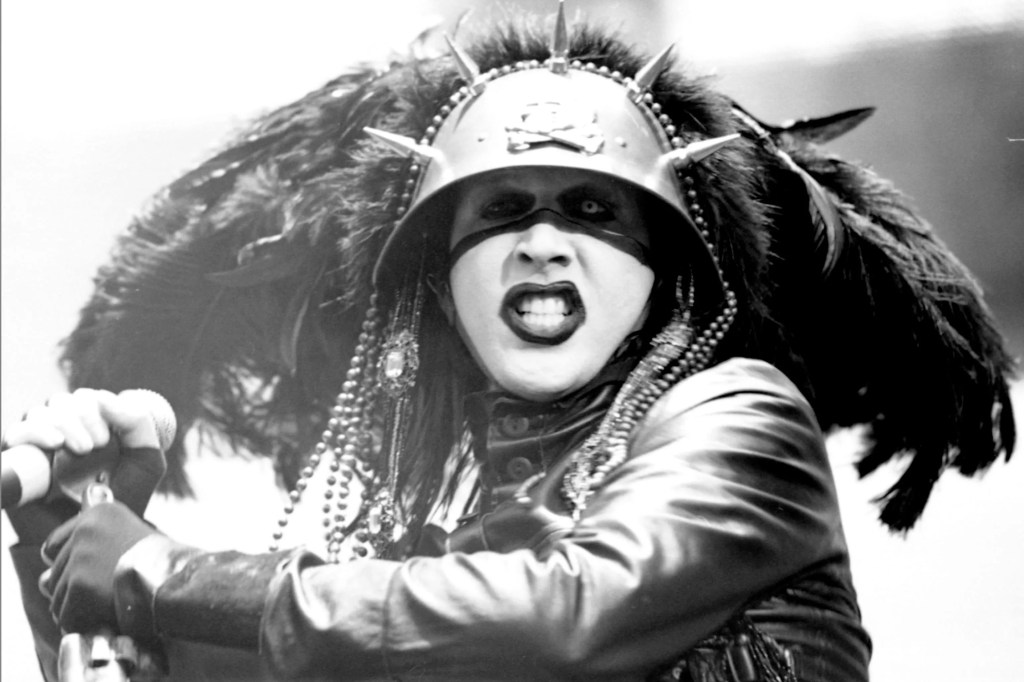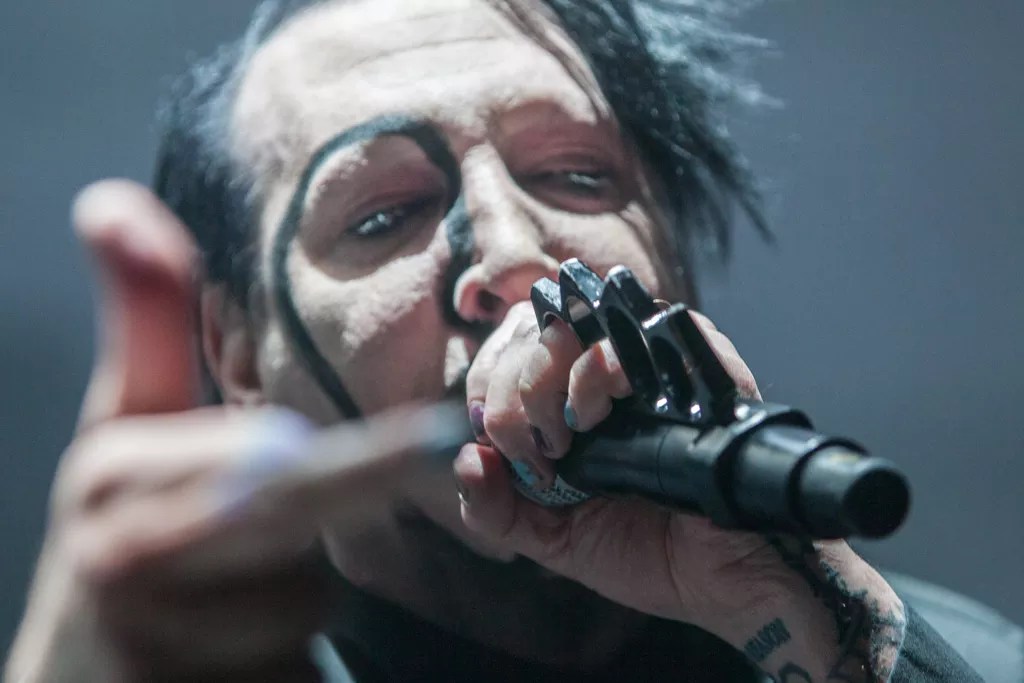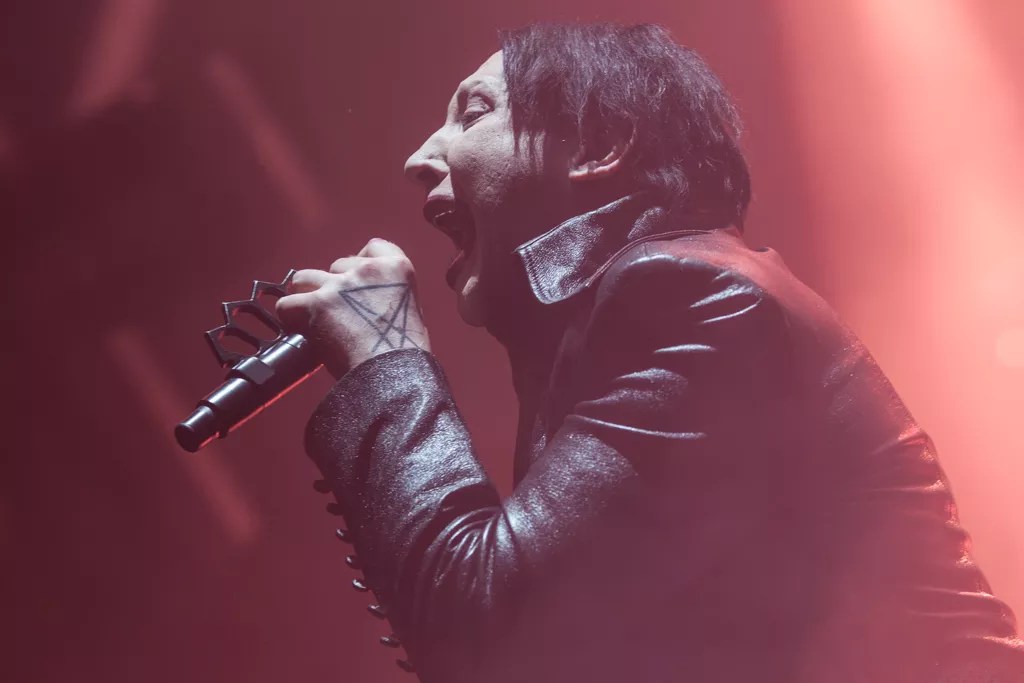
Brandon Thrift

Audio By Carbonatix
The self-proclaimed Antichrist Superstar is bringing his dope show to Denver on Thursday, September 25, at the Fillmore Auditorium in celebration of his twelfth album, last year’s One Assassination Under God – Chapter 1. And if you’re reading this, that means, like most of us, you were left behind during the supposed rapture this week. But you could get a feel for the end of days and pending Armageddon with Marilyn Manson — the angel with the scabbed wings, who in recent years has made settlements with two women accusing him of sexual assault and other abuses after facing similar allegations from over a dozen women since 2021.
In preparing for his appearance, we’re revisiting some of the most shocking moments in the career of shock-rock royalty.

Ticketmaster
Portrait of an American Anti-hero
Marilyn Manson, the perverse alter-ego of one Brian Warner, introduced himself to the zeitgeist with Portrait of an American Family, the game-changing 1994 debut that immediately made Manson one of the most revered and reviled pop-culture figures of the 1990s and beyond.
With such songs as “Cake and Sodomy,” “Get Your Gunn” and “Lunchbox,” Marilyn Manson — the nomenclature is a combination of Marilyn Monroe and Charles Manson, a clash of classic beauty and unfathomable murder — caught the attention of disenfranchised youth with a sinister style of industrial goth-rock and alternative metal.
Produced by Trent Reznor of Nine Inch Nails, another band known for pushing the limits musically and stylistically at the time, Portrait of an American Family felt like an autobiographical record for coming-of-age Gen Xers and Millennials. The wave of Manson impersonators — dressed in bondage pants, fishnet long-sleeves, sporting different colored contacts — scared the shit out of parents and politicians everywhere. And it made for great daytime television.

Lisa Siciliano
An Unlikely Mediator
Manson followed up the incendiary debut by doubling-down on his 1995 EP, Smells Like Children, a Twilight Zone twist combining the darker elements of films Willy Wonka & the Chocolate Factory and Chitty Chitty Bang Bang. It went platinum, in part because of the massive success of the single and Eurythmics cover “Sweet Dreams (Are Made of This).”
Not even three months later, his sophomore effort, Antichrist Superstar, dropped on January 1, 1996. The album proved to be Manson’s commercial breakthrough, with “The Beautiful People” and the title track becoming instant Manson anthems.
He rattled the cage of morality and convention so much that Republicans and Democrats came together in 1996 to condemn the obscenity Manson somehow popularized through an advocacy group named Empower America.
Spearheaded by Republican William Bennett and Democrats Joseph Lieberman and C. Delores Tucker, the pitch-forkers went after record companies for selling what they considered “prepackaged, shrink-wrapped nihilism,” including Manson’s music.
Tucker called Smells Like Children the “dirtiest, nastiest porno record directed at children that has ever hit the market,” while labels that sold such smut had “the blood of children on their hands.” Lieberman said Manson “celebrates some of the most antisocial and immoral behaviors imaginable.” Talk about a ringing endorsement. That same year, South Carolina, Utah and Virginia passed legislation banning the group from performing at state-operated venues, which were all later repealed.
Manson, being an alleged Church of Satan minister, ordained by founder and close personal friend Anton LaVey, and his propensity for tearing up Bibles and spewing anti-Christianity speeches and lyrics certainly didn’t endear him to scared squares. Check out his performance at the 1997 MTV VMAs, for example. Or see literally any of his music videos, press photos or art. Manson, the gender-bending Pale Emperor, always challenged long-held beliefs and worldviews, and never stopped.

Jacqueline Collins
Columbine Controversy
Manson’s career is marred with scandals, lawsuits and general hysteria, so much so that he’s widely considered the most controversial figure in rock history. But the ultimate mainstream witch hunt against him and large part why he’s lived in the crosshairs of contempt happened right here in Colorado, when the national media and local politicians made him the unwitting scapegoat following the Columbine High School shooting on April 20, 1999.
By all accounts, the perpetuators — Eric Harris and Dylan Klebold — were outsiders who were into metal music and violent video games, which does not make their actions anymore justifiable, but at least that was more palatable to Middle America and the Satanic Panic Generation. Shortly after the tragedy, which left thirteen dead and twenty-four more injured, the press started pointing the finger at Manson specifically, including reports that the shooters were wearing Manson T-shirts during the massacre and were devote fans of his music and messages of all-out anarchy. Neither were true. In fact, the two supposedly preferred bands such as Rammstein and KMFDM over Manson.
Of course, the typical lap-dog news consumer wouldn’t know the difference anyway, and the damage had been done. Sensationalist headlines linked Manson to Columbine based on nothing more than an assumption rooted in rumors. Then Denver Mayor Wellington Webb ultimately cancelled that year’s KBPI-FM annual Birthday Bash on April 30 due to Manson’s scheduled appearance, deeming the concert “inappropriate” since Harris and Klebold were believed to be fans of his.
Colorado politicians Bill Owens and Tom Tancredo further piled on by accusing Manson of spreading “hate, violence, death, suicide, drug use and the attitudes and actions of the Columbine High School killers.” On April 29, ten US senators, led by well-known Manson opponent and Kansas Senator Sam Brownback, shared a letter condemning the parent company in charge of distributing Manson albums and the artist himself for writing songs that “eerily reflect” Harris and Klebold’s act of violence.
Manson did not take all of this laying down, however. He decided to cancel the last four dates of the Rock Is Dead Tour out of respect for the victims and publicly criticized the Columbine media circus. In a Rolling Stone op-ed titled “Columbine: Whose Fault Is It?” Manson believed America’s gun culture, particularly the political power of the National Rifle Association, should be held more responsible for such a fatal incident than anything he wrote. The aftermath became nothing more than a “witch hunt,” he said, and ignored larger societal ills in favor of an easy-to-target public enemy.
“America loves to find an icon to hang its guilt on. But, admittedly, I have assumed the role of Antichrist; I am the Nineties voice of individuality, and people tend to associate anyone who looks and behaves differently with illegal or immoral activity,” Manson wrote.
Years later, in 2017, he told The Guardian how the Columbine massacre “destroyed my career at the time.” His 2000 record, Holy Wood, became a response to the controversy. Unfortunately, Columbine wasn’t the last time Manson was connected to school shootings and murders, some with more explicit evidence of the actors being Manson fans than others. Manson’s never faced any legal punishment in such cases.
But that also doesn’t make him immune to backlash and the court of public opinion. As he told The Guardian, “You don’t make a record called Antichrist Superstar and not expect people to hate you.”

Jacqueline Collins
History of Abuse?
While the public outcry simmered down in the decades since Manson burst onto the scene, allegations of extensive sexual and emotional abuse first surfaced in 2021, when former partner Evan Rachel Wood, who claimed she had been raped and abused for years, publicly named Manson as her abuser in a since-deleted social media post.
We won’t recount all the depraved and sadistic details here, but a wave of similar stories followed, including from Game of Thrones actress Esme Bianco, who filed a federal lawsuit in April 2021 claiming Manson violated human trafficking laws when he allegedly promised her roles in music videos and movies that never came to fruition, making her travel from England to California under false pretenses. The lawsuit was settled in January 2022.
A year later, in January 2023, an anonymous woman sued Manson for alleged abuse of a minor, including grooming, dating back to an incident while he was on tour in the 1990s. Manson agreed to a settlement in September 2023.
In November 2024, Manson settled a defamation lawsuit against Wood by agreeing to pay her legal fees.
Marilyn Manson, with Seven Hours After Violet, 7 p.m. Thursday, September 25, Fillmore Auditorium, 1510 North Clarkson St. Tickets are $76.